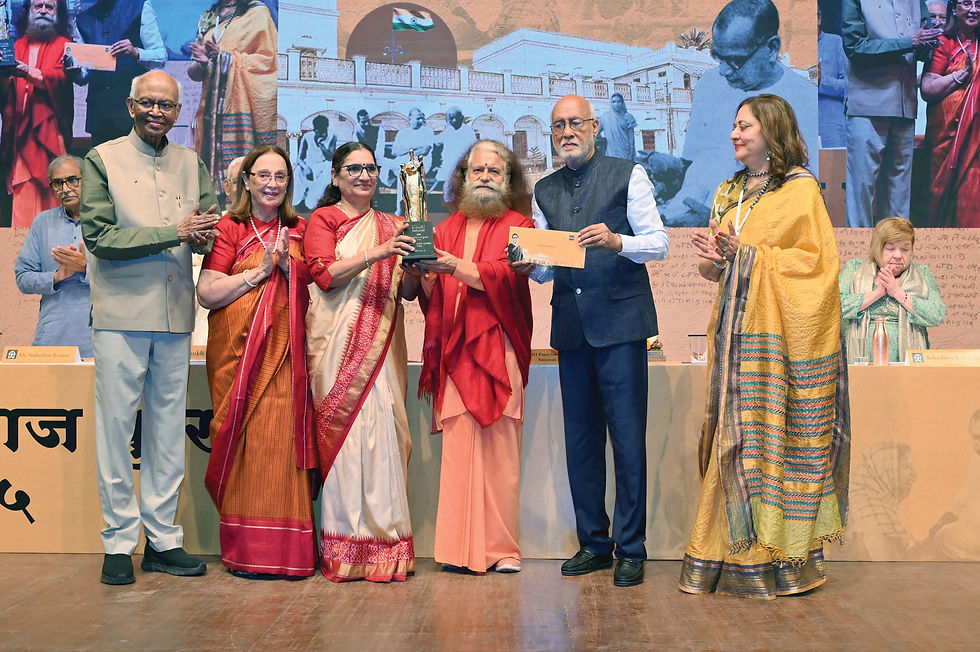Four champions of Gandhian values honoured
- Quaid Najmi
- Nov 13, 2025
- 2 min read

Mumbai: Four eminent personalities and champions of Gandhian principles from across India including one from Mumbai, were honoured with the coveted Jamnalal Bajaj Foundation (JBF) awards for their contributions of truth, non-violence and humanitarian services.
They are: Hasmukh Babubhai Patel of Gujarat for ‘Constructive Work’; P. M. Murugesan of Tamil Nadu for ‘Application of Science & Technology for Rural Development’; Triveni Acharya of Maharashtra for ‘Development & Welfare of Women and Children’; and Sekacheva Lyudmila Leonidovna of Russia for ‘Promoting Gandhian Values Outside India’.
Mumbai's journalist-turned-activist, Triveni Acharya is regarded as India's foremost anti-trafficking crusader for over 25 years, rescuing, rehabilitating and empowering survivors through her "Rescue Foundation", based in Kandivali east.
So far, the RF has rescued more than 7000 girls-women, opened four homes in different parts of India where more than 11,000 are given care, shelter and rehabilitation.
Beyond rescue, Acharya ensures holistic recovery through medical care, trauma counselling, legal aid, education and livelihood training, a Project Ekatra that empowers survivors to become mentors and peer leaders, etc., working with Police, foreign embassies and NGOs.
The ceremony’s Chief Guest was Pujya Swami Chidanand Saraswatiji Maharaj, along with JBF Chairman Shekhar Bajaj, Trustee and Chairman of Council of Advisors Dr. R. A. Mashelkar, and other dignitaries besides a distinguished eminent gathering.
Each awardee received a Citation, Trophy, and a cash prize of Rs 20 lakh, and reinforces the JBF’s mission to advance the vision of the legendary Jamnalal Bajaj - a close associate of Mahatma Gandhi - who dedicated his life to social reform and national development.
This year’s ceremony also carried a note of remembrance, being the first since the passing of Trustee Madhur Bajaj in April 2025, whose legacy of philanthropy and social commitment was fondly recalled.
“Every year, the Jamnalal Bajaj Foundation Awards spotlight individuals whose tireless work uplifts humanity. This year’s awardees have not only transformed lives but also rekindled faith in compassion and constructive action,” said Shekhar Bajaj.
Dr. Mashelkar described the honorees as “modern-day Satyagrahis - warriors of conscience who fight with compassion, not confrontation”.
“Each has proven that a single determined heart can illuminate darkness and restore hope, embodying Gandhian resilience and truth,” said Dr. Mashelkar.
Trustee and Hon. Director Minal Bajaj reflected on JBF’s guiding philosophy, recalling Gandhiji’s words about Jamnalal Bajaj: “He did not earn a single rupee through unethical means and spent whatever he earned for the good of the people.”
She added, “The Foundation continues to seek out these hidden gems, individuals transforming communities or reshaping nations, staying true to our mission of celebrating selfless service.”
Over nearly five decades, the JBF awards have stood as one of India’s foremost recognitions of humanitarian endeavour, continuing to inspire collective action rooted in the timeless ideals of Gandhi and Jamnalal Bajaj.





Comments